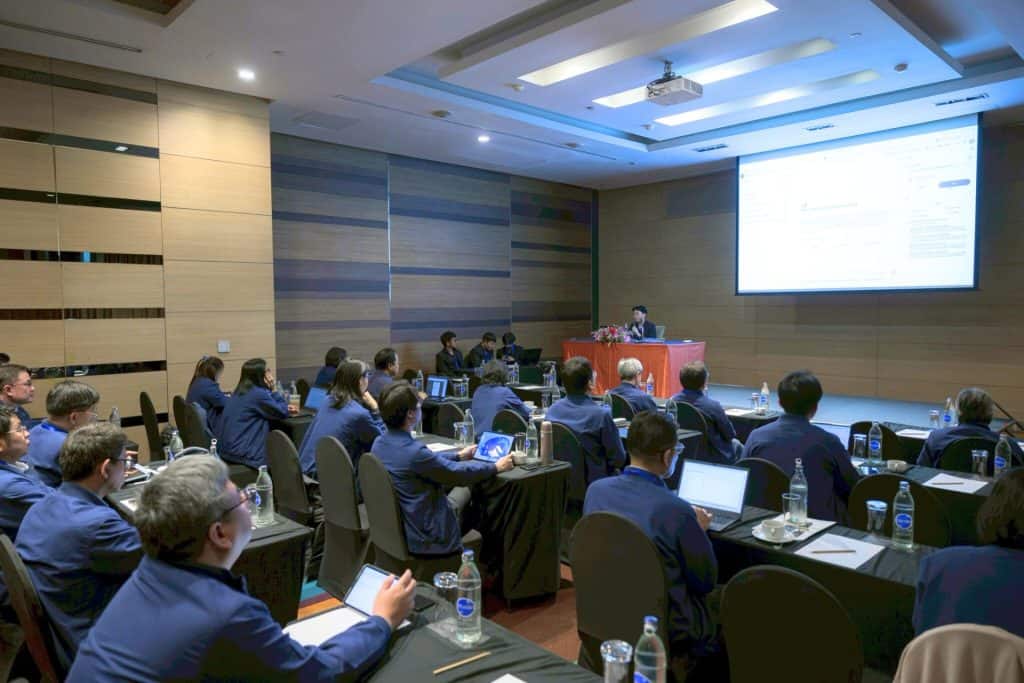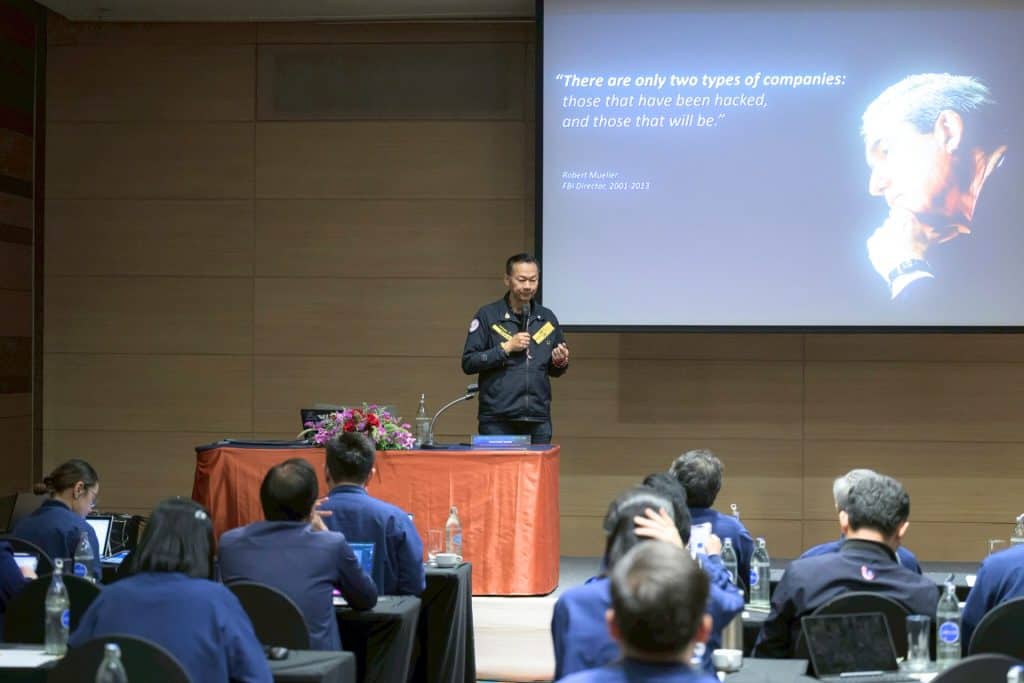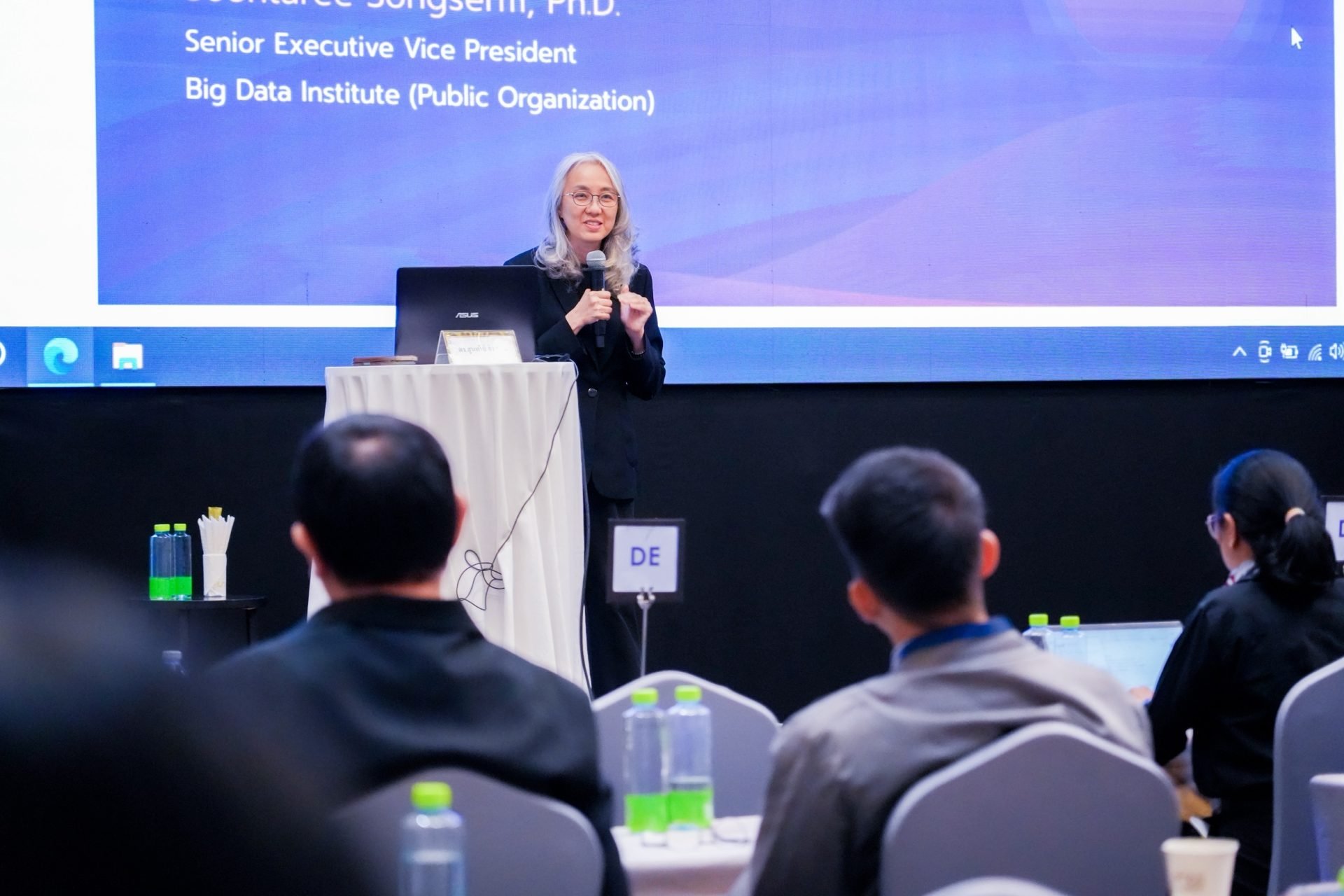19 มิถุนายน 2568, กรุงเทพฯ – สถาบันข้อมูลขนาดใหญ่ (องค์การมหาชน) หรือ BDI จัดอบรมหลักสูตร LEAD: Big Data and AI for Sustainable Future รุ่นที่ 2 ซึ่งจัดขึ้นเป็นสัปดาห์ที่ 3 ณ โรงแรมสวิสโซเทล กรุงเทพฯ รัชดา ก่อนเข้าสู่บรรยากาศการอบรมอย่างเป็นทางการ ผู้เข้าอบรมหลักสูตร LEAD ได้ร่วมกิจกรรม Session พิเศษ “A Daily Demo – AI Prompt & Play” ซึ่งเป็นการสาธิตการใช้งานเครื่องมือ AI Notebook LM เพื่อเปิดมุมมองใหม่ในการประยุกต์ใช้ AI สำหรับการแปลงข้อมูล เช่น บันทึกการประชุมหรือบทความ ให้ออกมาในรูปแบบที่เข้าใจง่ายและนำไปใช้ได้จริง ทั้งรูปแบบ Podcast และ รายงานสรุป ที่กระชับ ชัดเจน และพร้อมใช้ได้ทันที โดยเน้นการออกแบบ Prompt อย่างมีประสิทธิภาพ เพื่อดึงศักยภาพของ AI มาใช้ในบริบทการทำงานจริง

สำหรับการอบรมหลักสูตร LEAD รุ่นที่ 2 ในสัปดาห์ที่ 3 เริ่มต้นด้วยหัวข้อ AI Governance and Data Privacy โดย ผศ. ฐิติรัตน์ ทิพย์สัมฤทธิ์กุล อาจารย์ประจำศูนย์กฎหมายระหว่างประเทศ คณะนิติศาสตร์ มหาวิทยาลัยธรรมศาสตร์ ผู้เชี่ยวชาญด้านกฎหมายข้อมูลส่วนบุคคลและกฎหมายสากล ชี้ให้เห็นความเสี่ยงที่แท้จริงจากการใช้ AI ในองค์กร ไม่ใช่เพียงด้านเทคโนโลยี แต่รวมถึงเจตนา ความไม่โปร่งใส และบริบทของผู้ใช้งาน พร้อมเสนอแนวทางให้ผู้บริหารตั้งคำถามสำคัญ เช่น ใครได้รับผลกระทบ, AI ขยายปัญหาเดิมหรือไม่ และใครควรรับผิดชอบต่อความเสียหาย นอกจากนี้ยังได้อธิบายแนวคิด Risk-Based AI Governance ตามแนวทาง EU และหลักการสำคัญ 5 ประการ ได้แก่ ความปลอดภัย ความเป็นธรรม ความโปร่งใส ความเป็นส่วนตัว และการออกแบบโดยยึดมนุษย์เป็นศูนย์กลาง พร้อมเน้นว่าในสถานการณ์ที่กฎหมายยังไม่ครอบคลุมรอบด้าน สิ่งที่องค์กรต้องมีคือ “Social License to Operate” หรือความไว้วางใจจากสังคมในการใช้ AI อย่างมีจริยธรรม โปร่งใส และคำนึงถึงผลกระทบต่อสาธารณะอย่างแท้จริง


และช่วงบ่ายเริ่มการบรรยายในหัวข้อ HR Analytics โดย คุณสุภาวดี ฉายวิมล Executive Director บริษัท เฮกซ่าเทค โซลูชั่นส์ จำกัด ถ่ายทอดแนวคิดการนำข้อมูลและ AI มาใช้ในการยกระดับการบริหารทรัพยากรบุคคลให้มีประสิทธิภาพมากขึ้น ทั้งในด้านการวิเคราะห์แนวโน้มพนักงาน (Predictive Analytics), การวางแผนกำลังคน, การออกแบบ KPI ที่ขับเคลื่อนด้วยข้อมูล ไปจนถึงการใช้ Gen AI วิเคราะห์ข้อมูลเชิงคุณภาพจาก Performance Review เพื่อระบุปัจจัยที่ส่งผลต่อผลงานของพนักงานอย่างลึกซึ้ง นอกจากนี้ ยังอธิบายถึงการปรับเปลี่ยนบทบาทของ HR จากงานธุรกรรมสู่การเป็น Strategic Business Partner และการพัฒนา HR Operating Model ที่รองรับการทำงานแบบ Self-Service และ Automation โดยช่วงท้ายมี กิจกรรม Workshop ให้ผู้บริหารแต่ละกลุ่มสะท้อนความเห็น ผ่านการแชร์ว่า “สิ่งใดในองค์กรที่ HR ยังขาด” และ “สิ่งใดที่ HR ทำได้ดี” ซึ่งช่วยเปิดมุมมองใหม่ ๆ และสะท้อนแนวทางการพัฒนา HR ให้ตอบโจทย์ทั้งเป้าหมายทางธุรกิจและความคาดหวังของคนทำงานในโลกยุคใหม่


ปิดท้ายกับสัปดาห์ที่ 3 ในหัวข้อ Cybersecurity in the AI Era: Safeguarding the Future โดย พล.อ.ต.อมร ชมเชย เลขาธิการสำนักงานคณะกรรมการรักษาความมั่นคงปลอดภัยไซเบอร์แห่งชาติ (สกมช.) เน้นย้ำถึงความซับซ้อนของภัยคุกคามทางไซเบอร์ในยุค AI ที่มีตั้งแต่ Deepfake, AI-generated Malware ไปจนถึงการเจาะโครงสร้างพื้นฐานสำคัญ โดยเฉพาะในบริบทของ Hybrid Work และการใช้ข้อมูลขนาดใหญ่ พร้อมทั้งชี้ให้เห็นว่า AI ไม่ได้เป็นเพียงความเสี่ยง แต่ยังเป็นเครื่องมือสำคัญในการตรวจจับและตอบสนองต่อเหตุการณ์ได้อย่างมีประสิทธิภาพ นอกจากนี้ยังได้นำเสนอแนวทางการป้องกันในระดับนโยบายขององค์กร เช่น การใช้ NIST Cybersecurity Framework, การวางระบบสำรองแบบ Air Gap และ Immutable Backup, การสร้างวัฒนธรรม Cyber Awareness ภายในองค์กร รวมถึงการเตรียมพร้อมรับมือภัยคุกคามทางไซเบอร์ในอนาคต เช่น Quantum Threats และการโจมตีข้อมูลสุขภาพ/ชีวมิติ ฯลฯ โดยเน้นว่า Cybersecurity ไม่ใช่แค่เรื่องของ IT แต่คือ วัฒนธรรมขององค์กรยุคใหม่ ที่ทุกคนต้องมีส่วนร่วมและตื่นตัวอยู่เสมอ

ติดตามข่าวสารและรายละเอียดการรับสมัครหลักสูตร LEAD ได้ที่ เว็บไซต์: https://bdi.or.th/executive-course/ หรือ ติดต่อสอบถามได้ที่: 02-480-8833 ต่อ 9552 หรือ 9579

Public Relations and Communication Specialist
Big Data Institute (Public Organization), BDI
- Narisara Boonsrihttps://bdi.or.th/en/author/narisara-bo/
- Narisara Boonsrihttps://bdi.or.th/en/author/narisara-bo/
- Narisara Boonsrihttps://bdi.or.th/en/author/narisara-bo/
- Narisara Boonsrihttps://bdi.or.th/en/author/narisara-bo/










